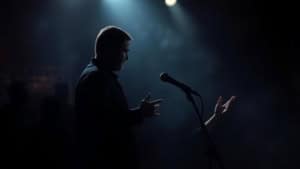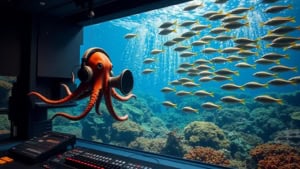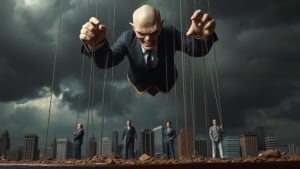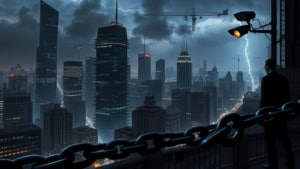Roger Waters' "The Powers That Be" delivers a hard-hitting critique of authority through rhythmic spoken word. The lyrics paint a vivid picture of corrupt elites enjoying luxury while manipulating the masses. Waters employs sharp satire, contrasting game shows and rodeos with darker themes of control and deception. He warns listeners to "run home before it's too late," hinting at an urgent need for awakening. The song's clever wordplay and metaphors, like "sheep's clothing" and "carrots and sticks," underscore its message about hidden agendas and power dynamics. This thought-provoking track invites listeners to look beyond the "soap opera state" and question the status quo. There's much more beneath the surface of this politically charged anthem.
Power Critiques Societal Structures
Key themes in "The Powers That Be":
- Critique of authority and power structures
- "The powers that be" as a central motif
- Portrayal of those in power as enjoying luxury and excess
- Manipulation and control
- References to "market forces" and "contingency plans"
- Imagery of "carrots and sticks" suggesting reward/punishment tactics
- Media and entertainment as tools of distraction
- Mentions of "game shows," "rodeos," and "TV"
- "Soap opera state" implying dramatized, sensationalized governance
- Corruption and deception
- "Sheep's clothing" metaphor suggesting hidden motives
- "Fear and loathing" indicating negative emotions used for control
- Resistance and awakening
- Call for "sisters of mercy" to join their brothers
- Warning to "run home before it's too late"
The song's themes align with Waters' broader artistic vision, employing synthesizer usage to create an otherworldly atmosphere that reinforces the lyrical content. This sonic landscape mirrors the complex relationship between isolation and technology explored in his work.
Ambiguities and open-ended elements:
- Unclear specific targets of criticism (could be governments, corporations, or other entities)
- Metaphorical language leaves room for various interpretations
- Mixing of serious critique with seemingly unrelated elements (fish report) creates ambiguity in overall message
The lyrics employ vivid imagery and metaphors to convey a complex critique of power structures and societal control mechanisms, inviting listeners to question and resist.
Rhythmic Spoken Word Delivery

"The Powers That Be" by Roger Waters features a rhythmic spoken word delivery that enhances the song's forceful messaging. The track employs a steady, driving beat that underpins Waters' emphatic vocal style, creating a sense of urgency and intensity.
The instrumentation is relatively sparse, allowing the lyrics to take center stage. A pulsing bassline and sharp, staccato guitar riffs punctuate the verses, adding to the song's overall tension. Synthesizers and electronic elements contribute to a cold, mechanical atmosphere that aligns with the criticism of powerful, impersonal forces described in the lyrics.
Waters' delivery alternates between spoken word and melodic sections, with his voice often taking on a sardonic tone. This vocal approach emphasizes the satirical nature of the lyrics, highlighting the contrast between the opulent lifestyle of "the powers that be" and the consequences of their actions.
The song's structure, with its repetitive musical phrases and lyrical patterns, reinforces the idea of systemic, cyclical power structures. The rhythmic nature of the delivery makes the message more memorable and impactful, almost like a chant or mantra.
Fish Report Radio Segment

The Powers That Be" is a track from Roger Waters' 1987 solo album "Radio K.A.O.S." The album tells the story of a disabled man named Billy who can hear radio waves in his head and eventually learns to communicate with a radio DJ.
The fish report segment mentioned in the song is likely a fictional radio show element within the album's narrative. It adds to the radio station atmosphere and contributes to the overall concept of the album, which revolves around themes of media, communication, and power structures.
The song's lyrics critique those in power, using vivid imagery to describe their preferences and behaviors. This aligns with Waters' known tendency to address political and social issues in his music, both during his time with Pink Floyd and in his solo career.
The radio station KAOS and characters like Billy and Jim are part of the album's storyline. The mention of specific locations like Los Angeles and Sunset Strip grounds the narrative in a real-world setting while maintaining the fictional elements of the concept album.
"The Powers That Be" reflects Waters' songwriting style, which often combines storytelling with social commentary. The song's structure, incorporating both lyrical verses and a fictional radio segment, demonstrates his approach to creating immersive concept albums that go beyond traditional song formats.
Satirical Critique of Authority

The lyrics of "The Powers That Be" by Roger Waters present a satirical critique of authority figures and power structures. The song portrays those in power as enjoying luxuries, manipulating markets, and controlling media and entertainment. It suggests they use fear, deception, and contingency plans to maintain their position.
The song's narrative shifts abruptly to a surreal fish report segment, which could be interpreted as a commentary on the absurdity of media distractions or the disconnect between everyday concerns and larger power dynamics.
My interpretation is that Waters is using vivid imagery and unexpected juxtapositions to highlight the contrast between the elite's excesses and ordinary people's experiences. The song seems to call for awareness and resistance against oppressive systems, while also acknowledging the difficulty of challenging entrenched power.
The mixture of pointed critique, surreal elements, and radio show format creates a complex and ambiguous piece. This richness of meaning allows for multiple interpretations, inviting listeners to reflect on power dynamics in society and their own relationship to authority.


Leave a Reply